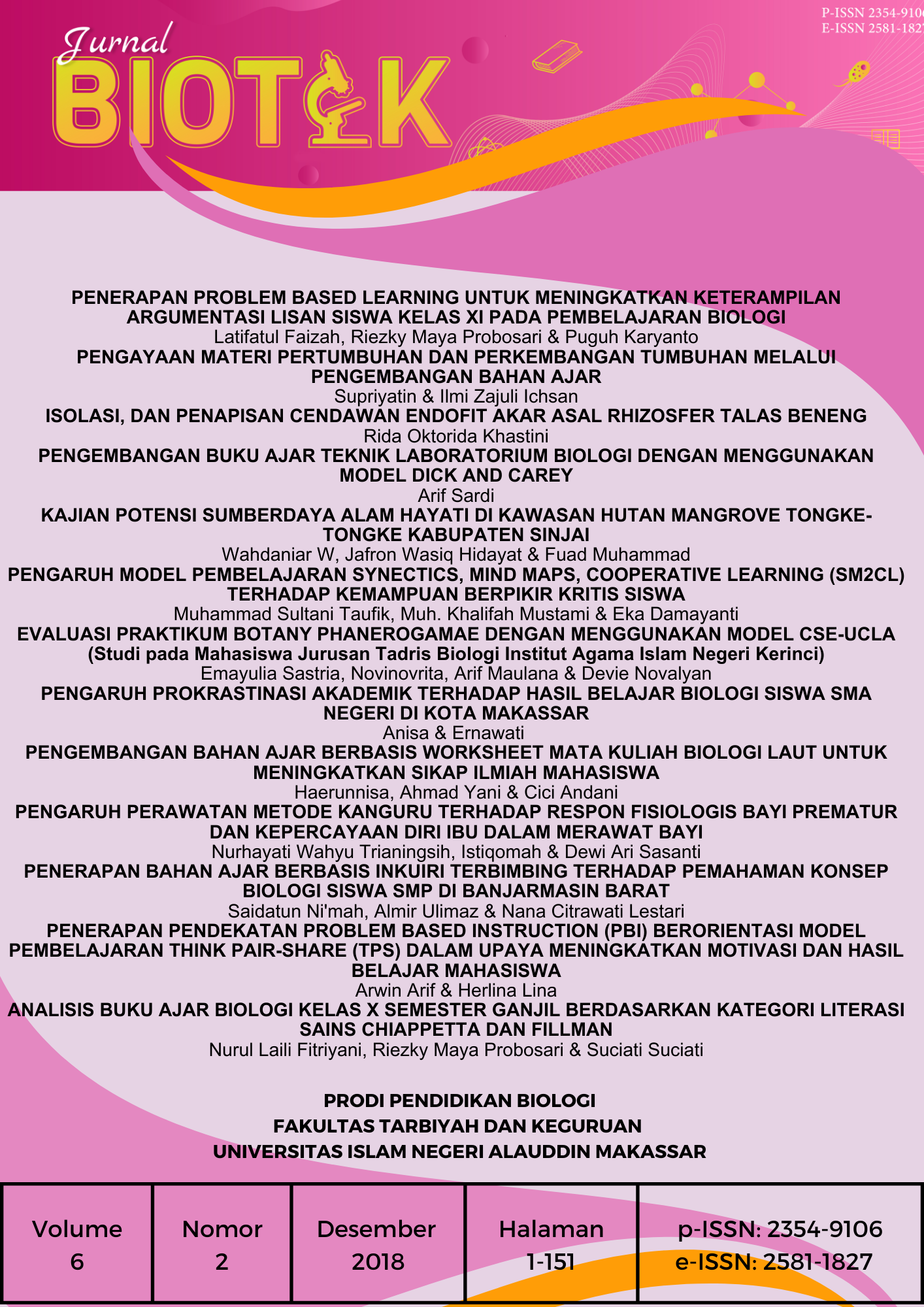PENERAPAN BAHAN AJAR BERBASIS INKUIRI TERBIMBING TERHADAP PEMAHAMAN KONSEP BIOLOGI SISWA SMP DI BANJARMASIN BARAT
Abstract
Abstrak
Penelitian ini bertujuan untuk mengetahui pengaruh penerapan bahan ajar berbasis inkuiri terbimbing terhadap pemahaman konsep pada Pembelajaran Biologi Siswa SMP di Kecamatan Banjarmasin Barat. Jenis penelitian adalah quasi experiment dengan melibatkan kelompok perlakuan dan kelompok kontrol. Rancangan penelitian dari kuasi eksperimen yang digunakan adalah The Nonequivalent Pretes–Postes Control Group Design. Populasi dalam penelitian ini adalah siswa SMP Kelas VII di Kecamatan Banjarmasin Barat. Penentuan sampel menggunakan random sampling. Sampel penelitian adalah SMPN 25 Banjarmasin kelas VIIC sebagai kelas eksperimen dan SMPN 33 Banjarmasin Kelas VIIC sebagai kelas kontrol. Kelas eksperimen difasilitasi dengan model inkuiri terbimbing dan kelas kontrol menggunakan pembelajaran konvensional. Teknik pengumpulan data menggunakan pretes dan postes. Analisis data dilakukan dengan teknik statistik deskriptif untuk mendeskripsikan data dari variabel penelitian. Pengujian hipotesis dilakukan dengan teknik analisis varian One Way Anova yang dibantu oleh program SPSS versi 16 for Windows. Taraf signifikansi dalam pengujian hipotesis adalah 0,05 (p ≤ 0,05). Sebelum analisis varians, dilakukan dahulu uji asumsi yaitu (1) uji normalitas data dan (2) uji homogenitas varian. Kesimpulan dari penelitian adalah terdapat pengaruh penerapan bahan ajar berbasis inkuiri terbimbing terhadap pemahaman konsep pada Pembelajaran Biologi Siswa SMP di Kecamatan Banjarmasin Barat karena p = 0,002 < α = 0,05.
Abstract
This study aims to determine the effect of the application of guided inquiry-based teaching materials on the understanding of concepts in Biology Learning of Middle School Students in West Banjarmasin District. This type of research is a quasi experiment involving treatment groups and control groups. The research design of the quasi experiment used was The Nonequivalent Pretest-Postes Control Group Design. The population in this study were Grade VII junior high school students in West Banjarmasin District. Determination of samples using random sampling. The research sample was SMPN 25 Banjarmasin class VIIC as an experimental class and SMP 33 Banjarmasin class VIIC as a control class. The experimental class is facilitated with a guided inquiry model and control class using conventional learning. Data collection techniques using pretest and posttest. Data analysis was carried out using descriptive statistical techniques to describe data from the research variables. Hypothesis testing was carried out with One Way Anova variant analysis technique which was assisted by SPSS version 16 for Windows. The significance level in testing the hypothesis is 0.05 (p ≤ 0.05). Before the analysis of variance, the assumption was tested, namely (1) data normality test and (2) variant homogeneity test. The conclusion of the study is that there is an effect of the application of guided inquiry-based teaching materials on the understanding of concepts in Biology Learning of Junior High School Students in West Banjarmasin District because p = 0.002 <α = 0.05.Downloads
References
Ahmadi, R. (2014). Pengantar Pendidikan: Asas dan Filsafat Pendidikan. Yogyakarta: Ar-Ruzz Media.
Hariyanto, W. d. (2013). Pembelajaran Aktif: Teori dan Asesmen. Bandung: PT Remaja Rosdakarya.
Jihad, S. d. (2013). Menjadi Guru Profesional: Strategi Meningkatkan Kualifikasi dan Kualitas Guru di Era Global. Jakarta: Esensi Erlangga Group.
K.A. Astiti, I. W. (2013). Pengaruh Model Pembelajaran Inkuiri Hipotetik terhadap Keterampilan Berfikir Kritis dan Keterampilan Proses Sains Siswa Kelas VII SMP Negeri 1 Singaraja. E-Journal Program Pascasarjana Universitas Pendidikan Ganesha, 1-13.
Mulyasa, E. (2009). Implementasi Kurikulum Tingkat Satuan Pendidikan: Kemandirian Guru dan Kepala Sekolah. Jakarta: Bumi Aksara.
Mustachfidoh, I. J. (2013). Pengaruh Model Pembelajaran Inkuiri Terhadap Prestasi Belajar Biologi ditinjau dari Intelegensi Siswa SMA Negeri 1 Srono. e-Journal Program Pascasarjana Universitas Pendidikan Ganesha, 1-11.
Roestiyah. (2012). Strategi Belajar Mengajar. Jakarta: PT Rineka Cipta.
Rusman. (2010). Model-model Pembelajaran ]: Mengembangkan Profesionalisme Guru. Jakarta: PT. RajaGrafindo Persada.
Rusydiyah, A. M. (2016). Desain Pembelajaran Inovatif: dari Teori ke Praktik. Jakarta: PT. RajaGrafindo Persada.
Sakdiah, M. d. (2018). Penerapan Model Inkuiri Terbimbing untuk Meningkatkan Pemahaman Konsep dan KPS pada Materi Listrik Dinamis Siswa SMP. (JIPI) Jurnal IPA dan Pembelajaran IPA, 41-49.
Setiawan, Y. A. (2013). Pengembangan Lembar Kerja Siswa (LKS) Berbasis Pendekatan Inkuiri Terbimbing dalam Pembelajaran Kooperatif pada Materi Kalor. Jurnal Pendidikan IPA Indonesia, 88-92.
Uski Apriliyana, H. F. (2012). Pengembangan Perangkat Pembelajaran Berbasis Inkuiri Terbimbing pada Materi Pencemaran Lingkungan dalam Upaya Melatih Keterampilan Berpikir Kritis Siswa Kelas X SMA. BioEdu, 39-44.
Copyright (c) 2018 Saidatun Ni'mah

This work is licensed under a Creative Commons Attribution-ShareAlike 4.0 International License.
Authors who publish with Jurnal Biotek agree to the following terms: Authors retain the copyright and grant Universitas Islam Negeri Alauddin Makassar right of first publication with the work simultaneously licensed under a Creative Commons Attribution License (CC BY-SA 4.0) that allows others to share (copy and redistribute the material in any medium or format) and adapt (remix, transform, and build upon the material) the work for any purpose, even commercially with an acknowledgement of the work's authorship and initial publication in Universitas Islam Negeri Alauddin Makassar. Authors are able to enter into separate, additional contractual arrangements for the non-exclusive distribution of the journal's published version of the work (e.g., post it to an institutional repository or publish it in a book), with an acknowledgement of its initial publication in Universitas Islam Negeri Alauddin Makassar. Authors are permitted and encouraged to post their work online (e.g., in institutional repositories or on their website) prior to and during the submission process, as it can lead to productive exchanges, as well as earlier and greater citation of published work (See The Effect of Open Access).

This work is licensed under a Creative Commons Attribution-ShareAlike 4.0 International License.



